
By Caroline Denny, Cycle of Good Volunteer, Blantyre, Malawi
In rural Malawi job opportunities are rare but today I had the chance to see one success story that is transforming the life of many people in a village. I am volunteering for Cycle of Good (Cog) in Malawi and went with Mary Kamwendo the manager of Cog to see where the woven bicycle panniers and front baskets for the Elephant bikes are made. We travelled 40km outside of Blantyre, turned off the main road at Lilangwe and drove on untarred tracks and then what seemed to be no more than a wide footpath until we arrived at Chifundo’s house in the village of Mlumbe. We passed women at the water pumps and many young children playing. The main crop here is maize and as it is nearly April and harvest time I saw lots of tall strong stalks. On arrival we were welcomed by Chifundo Mwantali who is the coordinator of the basket weavers in the village. We also met Thomas Misomali and Isaki Misomali who are part of the group of weavers for Cog. They made me most welcome and I enjoyed listening to their story.
It was a chance meeting with Mary in Blantyre when Chifundo was selling some of his shopping baskets that led to discussions about making the front baskets for the Royal Mail bikes. It was clear to Mary the quality of his work was excellent and so she suggested he took a sample bicycle basket back to the village to see if they could be made in Mlumbe. Chifundo told me, “We had to work hard at getting it right but we were determined as we knew this amount of work would be good for our village. We are very excited our baskets will be sold outside of Malawi”.
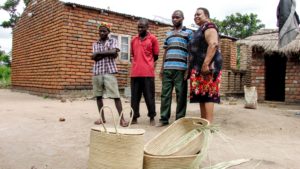
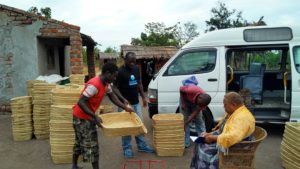
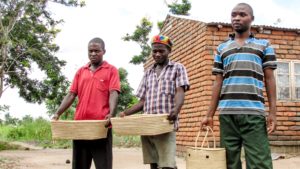
Chifundo’s parents and grandparents were weavers and taught him the skill. “This is how people learn the skill of weaving here. It is something we can do in the here and not have to move away to find a job”. Chifundo has always lived in Mlumbe. He has a wife and 3 children aged 11, 8 and 5. In this village it tends to be the men who work at the weaving, you need to have strong hands. Chifundo said, “Before we worked for Cog we made different shopping baskets, mats and trays to sell in the local market but some weeks we did not sell any. This meant it was difficult to earn enough money for our families”.
Chifundo chose a team of 6 men to make the baskets as they were the most skilled. He knew the baskets would be rejected if they did not meet the precise measurements and quality weaving required for export. The baskets are made from dried palm leaves cut with a knife into long strips. These are then bound and sewn together using a long needle threaded with a thin palm leaf strip. “We start with the flat base and work up the sides of the basket”. There are some palm leaves in Mlumbe but the best palm leaves come from south of Blantyre near the Shire river. The villagers there have to get a forest licence and the amount cut is controlled, so we know the palm leaves come from a sustainable source. The plants regenerate quickly if not too much is cut at once.
There is no central place for making so the weavers gather at Chifundo’s house to collect the leaves when they were delivered. Then they would do the weaving at their own home sitting outside in the sun. The equipment is simple, each man needs a knife and a long needle which can be brought at the market but I can see it is a real skill to master the technique of getting the basket shape right. Each basket takes around 2 days to make. When it is time for collection all the baskets are brought to Chifundo’s house for quality checking. “It is quite an event for us when Cog come and collect the baskets”, said Thomas, “as we know we will be taking home some money”. With the large families in Malawi this means about 50 people are benefitting from this work.
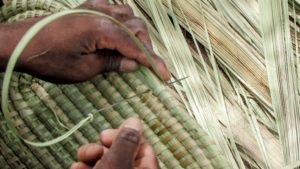
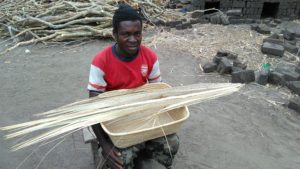
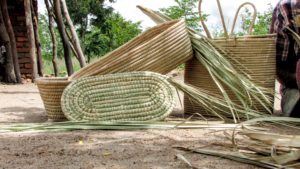
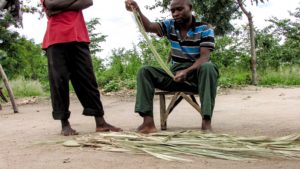
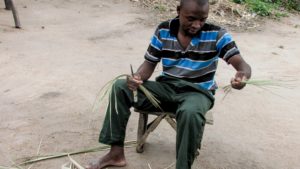
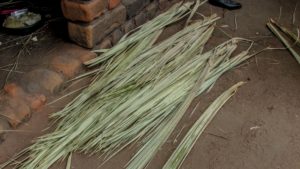
Chifundo said, “An order this size has transformed many people’s lives in our village as several months of guaranteed income meant we were able to purchase items we could not normally afford before”. For Isaki he knows he can afford the school fees for his children. In Malawi all secondary schools charge fees and there is an exam fee. For many families this means the children cannot take the exam and so leave school without the leaving certificate. Chifundo told me, “In my case I want a bicycle but my immediate priority is to use the money to extend my house. My house was only one room and I really wanted to build a bigger house for my family”. Chifundo then proudly showed me the changes he has made to his house.
Chifundo told me that first he had to make the bricks. “We do this in the traditional way using local clay and a mould, then we dry the bricks by building a large pile and lighting a fire underneath. Then I brought some iron sheets that I would need for the roof. I can buy one iron sheet for what I get for making one basket. I needed 30 for my new roof. For the first time I was able to buy a solar panel and some lights for my house. For this I needed to hire an electrician. It is wonderful we have good light in the evenings now. It gets dark at 6pm and now my children have safe light. Some people have had accidents with the kerosene lamps that are used here. I am so proud of my new house”.
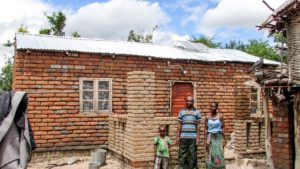
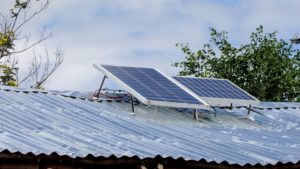
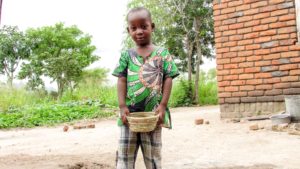
Chifundo began telling me about the work involved in the panniers. “They are more difficult to make than the baskets but we shared our ideas and have managed to make them well. I hope the customers are happy as we would like to make some more for you”.
It is a long journey from Mlumbe, Malawi to the UK but it is so interesting to see where the products I use come from, and meet the people who make them. They are really skilled craftsmen and I know that Cog is making a difference to these families by enabling them to earn a living from something they really enjoy doing and who take pride in their work.




